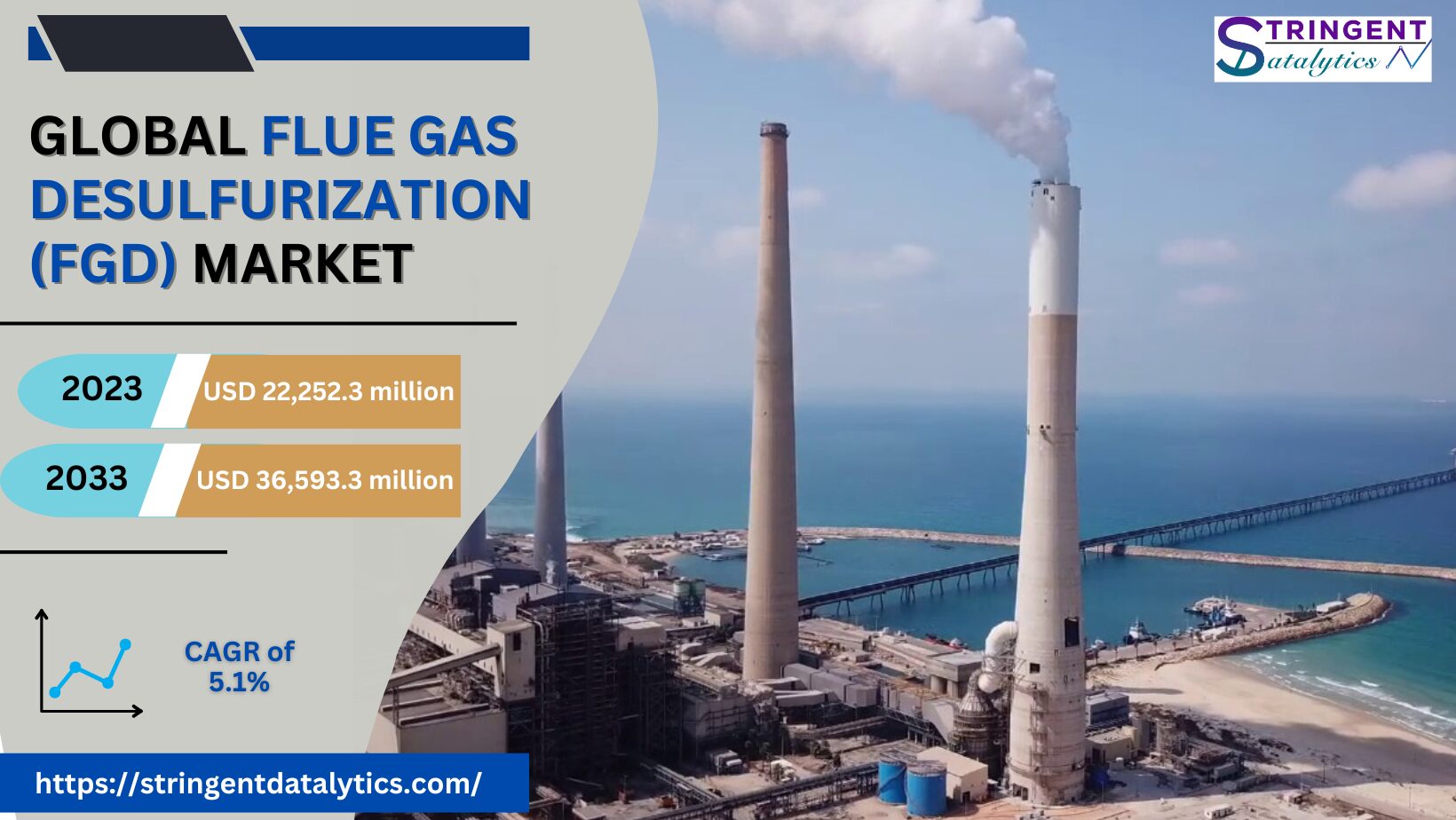The global flue gas desulfurization (FGD) system market is expected to have a compound annual growth rate (CAGR) of 5.1% from 2023 to 2033. In 2023, the market is expected to be worth USD 22,252.3 million and to reaching a value of USD 36,593.3 million by 2033.
Introduction
Flue Gas Desulfurization (FGD) is a critical technology used to remove sulfur dioxide (SO₂) from exhaust flue gases of fossil-fuel power plants and other industrial processes. This technology is essential for reducing air pollution and meeting environmental regulations. The FGD market has been growing due to increased regulatory pressure and the need for cleaner air.
Market Analysis
The FGD market is segmented by technology, application, and geography. Key technologies include wet FGD, dry FGD, and semi-dry FGD systems. Applications primarily encompass power generation, chemical, iron and steel, cement manufacturing, and other industries.
Market Drivers:
- Stringent Environmental Regulations: Governments worldwide are enforcing stricter emissions standards to combat air pollution.
- Industrialization and Urbanization: Rapid industrial growth and urbanization increase the demand for energy, leading to higher installation rates of FGD systems in power plants and industrial facilities.
- Technological Advancements: Innovations in FGD technology improve efficiency and reduce operational costs.
- Environmental Awareness: Growing public awareness and demand for sustainable practices drive the adoption of FGD systems.
Challenges:
- High Installation and Operational Costs: The initial investment and ongoing maintenance expenses can be substantial.
- Technical Complexity: Implementing and managing FGD systems requires specialized knowledge and technology.
- Economic Slowdown: Fluctuations in the global economy can impact investments in large-scale environmental control projects.
Key Trends and Factors
- Advancements in FGD Technology: Development of more efficient and cost-effective FGD systems, including advancements in absorbent materials and process integration.
- Shift Towards Renewable Energy: While renewable energy adoption is increasing, the transition period still necessitates effective pollution control for existing fossil fuel power plants.
- Market Expansion in Developing Regions: Countries in Asia-Pacific and Africa are investing in FGD technology due to increasing energy demands and stricter environmental regulations.
- Retrofitting and Upgradation: Many existing power plants and industrial facilities are being retrofitted with advanced FGD systems to comply with new regulations.
Working and Technology
FGD Operation:
- Gas Absorption: Flue gases are treated with a sorbent, typically lime or limestone, which reacts with sulfur dioxide to form calcium sulfite or calcium sulfate.
- Removal of Byproducts: The byproducts are then removed from the gas stream. In wet FGD systems, this typically involves a slurry that captures the sulfur compounds, which are then separated and removed.
- Emission Control: The cleaned flue gas, with significantly reduced SO₂ levels, is released into the atmosphere.
Key Technologies:
- Wet FGD Systems: Use a liquid absorbent to remove SO₂. They are highly efficient but have higher operational costs and require more maintenance.
- Dry FGD Systems: Use a dry sorbent, offering lower operational costs and easier maintenance, but typically with lower efficiency compared to wet systems.
- Semi-Dry FGD Systems: Combine aspects of both wet and dry systems, aiming to balance efficiency and cost-effectiveness.
Receive the FREE Sample Report of Flue Gas Desulfurization (FGD) Market Research Insights @ https://stringentdatalytics.com/sample-request/flue-gas-desulfurization-(fgd)-market/14961/
Market Segmentations:
Global Flue Gas Desulfurization (FGD) Market: By Company
Mitsubishi Heavy Industries
General Electric
Doosan Lentjes
Babcock & Wilcox Enterprises
Rafako
Siemens
Flsmidth
Hamon Corporation
Clyde Bergemann Power Group
Marsulex Environmental Technologies
Thermax
andritz
Global Flue Gas Desulfurization (FGD) Market: By Type
Wet FGD System
Limestone
Seawater
Dry & Semi-dry FGD System
Others
Global Flue Gas Desulfurization (FGD) Market: By Application
Iron & Steel Industry
Cement Manufacturing Industry
Power Generation
Chemical Industry
Others
Regional Analysis of Global Flue Gas Desulfurization (FGD) Market
All the regional segmentation has been studied based on recent and future trends, and the market is forecasted throughout the prediction period. The countries covered in the regional analysis of the Global Flue Gas Desulfurization (FGD) market report are U.S., Canada, and Mexico in North America, Germany, France, U.K., Russia, Italy, Spain, Turkey, Netherlands, Switzerland, Belgium, and Rest of Europe in Europe, Singapore, Malaysia, Australia, Thailand, Indonesia, Philippines, China, Japan, India, South Korea, Rest of Asia-Pacific (APAC) in the Asia-Pacific (APAC), Saudi Arabia, U.A.E, South Africa, Egypt, Israel, Rest of Middle East and Africa (MEA) as a part of Middle East and Africa (MEA), and Argentina, Brazil, and Rest of South America as part of South America.
Click to Purchase Flue Gas Desulfurization (FGD) Market Research Report @ https://stringentdatalytics.com/purchase/flue-gas-desulfurization-(fgd)-market/14961/?license=single
Historical Developments
Early Developments:
- FGD technology was developed in response to the Clean Air Act in the United States during the 1970s, which mandated reductions in sulfur dioxide emissions from power plants.
Significant Milestones:
- 1980s-1990s: Widespread adoption of FGD systems in developed countries, particularly in the power generation sector.
- 2000s: Technological advancements led to more efficient and cost-effective FGD systems.
- Recent Years: Increased adoption in developing countries, driven by stricter environmental regulations and international agreements on air quality.
Objective
The primary objective of FGD technology is to reduce sulfur dioxide emissions from industrial sources, thereby minimizing air pollution and its harmful effects on human health and the environment. FGD systems aim to comply with environmental regulations, enhance public health, and support sustainable industrial practices.
About Stringent Datalytics
Stringent Datalytics offers both custom and syndicated market research reports. Custom market research reports are tailored to a specific client’s needs and requirements. These reports provide unique insights into a particular industry or market segment and can help businesses make informed decisions about their strategies and operations.
Syndicated market research reports, on the other hand, are pre-existing reports that are available for purchase by multiple clients. These reports are often produced on a regular basis, such as annually or quarterly, and cover a broad range of industries and market segments. Syndicated reports provide clients with insights into industry trends, market sizes, and competitive landscapes. By offering both custom and syndicated reports, Stringent Datalytics can provide clients with a range of market research solutions that can be customized to their specific needs.
Reach US
Stringent Datalytics
+1 346 666 6655
Social Channels:




Leave a Reply